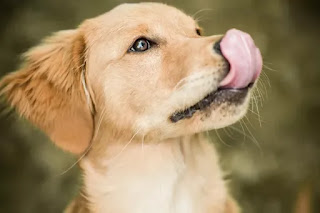When you observe a dog licking its lips, the instinct might be to assume it's simply enjoying a meal or anticipating something tasty. However, if there's no food in sight, the dog's lip-licking behavior could be a form of communication, indicating that the dog perceives something in its surroundings as a potential threat. Lip licking serves as a type of body language through which a dog conveys its feelings.
Let's delve into the significance of a dog licking its lips unrelated to eating and explore ways to address this behavior.
Understanding Lip Licking in Dogs:
What Is Lip Licking in Dogs? Lip licking in dogs is precisely what it sounds like—when a dog licks its lips in the absence of food, it typically signifies a message being conveyed.
What It Means When Dogs Lick Their Lips: Renowned dog trainer and behaviorist Turid Rugaas introduced the term "calming signals" to describe lip licking and similar behaviors. Lip licking is often considered an appeasement gesture, employed by dogs to express concern or discomfort in stressful situations. Dogs resort to such behaviors when faced with perceived threats, using lip licking as a way to soothe and appease individuals or animals they view as potential aggressors.
For instance, a dog scolded for an indoor accident might not link the scolding to the misbehavior but may interpret the owner's reaction as a threat. In response, the dog might lick its lips and avert its gaze, signaling an attempt to ease the perceived tension and communicate non-aggression.
Sometimes, dogs display appeasement gestures like lip licking and yawning when they encounter frustration or confusion, particularly evident during training sessions. If these signs emerge, it's advisable to pause the training, as stressed dogs struggle to grasp new concepts. Ending the session on a positive note with familiar commands and rewards, followed by bonding time, helps the dog relax.
Excessive lip licking could also be an indicator of health issues, including nausea, dental problems, or mouth pain. Owners should monitor their dogs closely for signs of illness and consult a veterinarian if in doubt.
Reasons for Lip Licking in Dogs:
Stress and Discomfort:
- Lip licking serves as a submissive gesture to prevent the escalation of aggression, indicating the dog's unease in a situation.
Potential Health Issues:
- Excessive lip licking may signal underlying health problems, such as nausea, dental concerns, or oral discomfort.
What to Do if Your Dog Is Licking Its Lips:
While lip licking generally aims to diffuse potential aggression, it signifies that a dog is stressed and uncomfortable. If you notice lip licking, providing space for the dog to relax is crucial. Identify and eliminate the source of the dog's concern whenever possible to prevent potential defensive or aggressive behavior.
If the dog is uneasy at the vet or in a nerve-wracking environment, redirecting its focus positively—such as asking for a trick and rewarding compliance—can help alleviate stress. Avoid reinforcing fear or anxiety by comforting the dog in such situations.
In training sessions, if lip licking becomes apparent, wrapping up the session positively and breaking down actions into smaller segments for easier learning can be effective.
Persistent lip-licking behavior in non-threatening situations may indicate environmental stressors, prompting further investigation. Additionally, considering potential health issues, a visit to the vet for a check-up is advisable when in doubt.





Không có nhận xét nào:
Đăng nhận xét